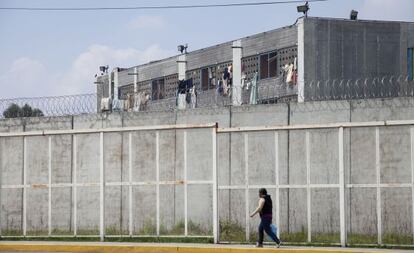Inmates in Mexico hold the government hostage from their prison cells
Corrupt wardens allow prisoners to obtain cellphones and switch off signal jammers


The Mexican government has not been able to come up with any hard-hitting strategies to eradicate the rampant crime that exists throughout the nation’s penitentiary system. Mexico’s jails have become “call centers” for crimes, where inmates routinely order extortion and murder, and control bands of delinquents on the outside from their own cells.
Even though there are strict rules about the use of cellphones inside jails and prisons, and in spite of a network of signal jammers put in place, corruption prevails. Phones can be obtained quite easily by inmates, and many times the jammers are mysteriously switched off.
Authorities have found it difficult to control prisoners in their custody, including those who are put in solitary confinement. And no one has come up with a solution to this problem, which has been growing for years. Extortion and kidnappings have been on the rise over the past few months.
“It is very important to find out whether the signal jammers are operating correctly from inside the prison complexes,” said Renato Sales, who was recently named national anti-kidnapping coordinator, during a news conference on Wednesday.
While the government cannot be assured that all penitentiary officers will remain honest or refuse to bow down to inmate threats, Mexico’s interior officials are discussing ways to operate the jammers by remote control through a central operation center.
“To begin with, cellphones should not be allowed inside the penitentiaries but we recognize that inmates in a large number of the jails and prisons have cellphones,” he said.
Civic groups and victims organizations have been calling on the Mexican government to deal with the problem for years.
“There really isn’t any good will on the part of authorities to stop it,” said María Elena Morera, who is president of the NGO Common Cause, which helps loved ones of kidnap victims cope. Morera knows what many people are going through; she also lived through tragic moments when her husband was kidnapped some years back.
But many criminals see her social work and pressure group as a threat. On one occassion, Morera received a severed index finger in the mail as a warning.
“We are facing serious problems in dealing with corruption,” said Isabel Miranda de Wallace, who helped catch the kidnappers and murderers of her son. She now is head of a rights organization called Stop Kidnappings.
We recognize that inmates in a large number of the jails and prisons have cellphones”
According to recent figures from the National Citizens Observatory, there are jammers in 200 federal correctional complexes, which form part of the country’s 300 prisons and jails. There are no figures on the number of jammers at state or local jails.
“The jammers don’t work because they are operated by wardens and directors in the penal system,” said De Wallace.
There are also no official figures on extortion carried out via telephone. Francisco Rivas, president of the observatory, believes that 95 percent of all extortion threats come from a prison. In 2013, there were 8,042 complaints filed with authorities but many believe that the figure is higher because there are citizens who don’t report the crimes. Last month, EL PAÍS discovered that only one out of 10 kidnappings is reported.
The calls are made by people who know the victim or the victim’s family. The caller demands money be paid or otherwise the victim will be harmed. In many cases, screams can be heard coming from a third accomplice in the background.
“If you are a victim, we recommend that you hang up immediately and check to see if your family is okay and then file a complaint. If you don’t recognize the number, don’t answer the phone,” said Sales, who was appointed by President Enrique Peña Nieto.
Sales must deal with two problems facing Mexican society: kidnappings and extortion attempts.
“What we need is that the federal authorities have enough resources to prevent kidnappings and extortion from being planned inside the penal system as is happening today,” he explained.
His words are clear but the results so far have been poor. As De Wallace put it: “It is embarrassing that Mexico cannot control its prisons.”
Tu suscripción se está usando en otro dispositivo
¿Quieres añadir otro usuario a tu suscripción?
Si continúas leyendo en este dispositivo, no se podrá leer en el otro.
FlechaTu suscripción se está usando en otro dispositivo y solo puedes acceder a EL PAÍS desde un dispositivo a la vez.
Si quieres compartir tu cuenta, cambia tu suscripción a la modalidad Premium, así podrás añadir otro usuario. Cada uno accederá con su propia cuenta de email, lo que os permitirá personalizar vuestra experiencia en EL PAÍS.
¿Tienes una suscripción de empresa? Accede aquí para contratar más cuentas.
En el caso de no saber quién está usando tu cuenta, te recomendamos cambiar tu contraseña aquí.
Si decides continuar compartiendo tu cuenta, este mensaje se mostrará en tu dispositivo y en el de la otra persona que está usando tu cuenta de forma indefinida, afectando a tu experiencia de lectura. Puedes consultar aquí los términos y condiciones de la suscripción digital.








































